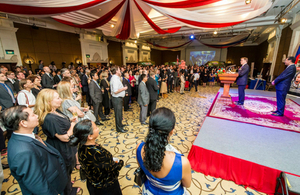Queen's Birthday Party 2016
Last week, on 21 April, the British people celebrated the 90th Birthday of Her Majesty Queen Elizabeth II.

Her life is a truly extraordinary record of public service in duty: In 1940, just 14 years old, the then Princess Elizabeth made her first BBC radio broadcast to bring comfort and hope to the children who had been evacuated from Britain’s cities during the second world war.
At 18 she became the first female member of the Royal family to join the armed forces, joining the women’s Auxiliary Territorial Service, training as a driver and a mechanic.
And at just 21 she made a defining broadcast from Cape Town in which she said: “My whole life whether it be long or short shall be devoted to your service”.
As British Prime Minister, David Cameron said, as he led tributes in Parliament: “this was an extraordinary promise profoundly fulfilled. In this modern Elizabethan era, in which so much around her has changed, Her Majesty has been steadfast, a rock of strength for our nation, for our Commonwealth, and on so many occasions, for the whole world.”
Since ascending to the throne in 1952 (a year before Cambodia regained independence) She has worked with 12 different British Prime Ministers, starting with Sir Winston Churchill, well over 150 Prime Ministers in her other Realms and met a quarter of all American Presidents since Independence.
As we look ahead to our own celebration this week of The Queen’s 90th Birthday, where we will host many hundreds of distinguished guests from the Royal Government of Cambodia, the diplomatic corps, civil society leaders and students, we can also reflect on a positive year for UK-Cambodia relations.
Our two Kingdoms enjoy a very broad-based relationship: Some of our work offers support for Cambodia’s efforts to address the most troubling legacies of its past, such as our significant funding, £3.6 million over three years, for demining work. And we support the vital role of the ECCC, to which the UK has contributed nearly US$12 million since 2006, in bringing the surviving Khmer Rouge leaders to account.
But the majority of our efforts are forward looking:
Right now a record 16 Cambodians (nine of whom are women) are in the UK on Chevening scholarships– the British Government’s official scholarship programme. We expect to send an even higher number later this year. Here in Cambodia, our dynamic Chevening network of alumni has been busy too. With our support, several alumni have established Leadership/ Career Development Learning Sets; offering sessions for Cambodian students with advice, mentoring and information about the opportunities they have found from their own experiences. And we will be working with the alumni in the months ahead to establish an internship programme whereby 10 Chevening alumni host interns from disadvantaged backgrounds with our financial support, in their respective institutions.
Supporting and encouraging Cambodia’s next generation is a theme running through much of our work. In this respect, nothing is more important than education. And the promotion of education in the STEM subjects – Science, Technology, Engineering and Mathematics, has been our mission this year. Many students in Cambodia think these subjects are too difficult or won’t lead to well paid jobs. But STEM subjects are critical for the country’s future success. Cambodia needs more engineers, more electricians, more statisticians, more doctors, more architects, more research scientists.
Working with local partners, we have: produced a Khmer language guide for Cambodian students detailing the career opportunities that these disciplines offer; brought an innovative Maths teaching idea to Cambodia devised by a British high school teacher, called “Diagnostic Questions” which works by identifying the type of mistakes students make and adjusting the teaching accordingly and established a network of Cambodian STEM Ambassadors – volunteers already active in STEM fields who have gone out into the cities and provinces and spoken in person to over 10,000 students about the Advantages of taking a STEM subject. On top of that, our Embassy colleague, Bryony Mathew, even wrote a STEM-themed children’s book, Sky Pods in Phnom Penh, to inspire the even younger generation of future engineers.
On the commercial front, we aim to encourage greater private sector contact between our two countries and a growing role for British business in Cambodia’s development. UK household names, such as Jaguar Landrover, Prudential, GSK and Costa Coffee, are already prominent in this market.
On the environmental side, we were pleased to support work with the Ministry of Environment as they prepared their offer for the major COP 21 Conference on Climate Change held in Paris at the end of 2015.
Last but definitely not least is the support we offer our own nationals. Our consular services have experienced a very busy year: in the first six months of 2015, over 80,000 Brits (a record) visited Cambodia, making us the largest source of visitors from outside the region after the US.
To follow our work on a regular basis please join our other 300,000 followers on our Facebook page, British Embassy in Cambodia, and on our Twitter accounts: @ukincambodia, @wjlonghurst and @bryonymathew.